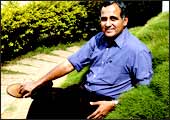|
What is it: It's
an alternative communications tool for paralytics, called Glabenator,
invented by Apurv Mishra, a 16-year-old Class 10 student of DAV
Public School, Bhubaneswar
How does it work: The Advanced Alternative and Augmentative
Communication Solution is based on the concept of directional
displacement, which allows a paralytic to use his eye muscles
to interact with a computer which interprets the signals and translates
them into word messages on the screen
What was the trigger: The sight of his paralytic grandfather,
suffering in a hospital bed trying to communicate, fired Mishra
to work on an alternative communication tool for paralytics
How much does it cost: Rs 1,350
Is it patented: In India it is. Mishra's looking for
sponsors to patent it in the US and to manufacture it commercially
-Ritwik Mukherjee
Indigenous Bt Cotton
 |
| Narayanan: The man behind it all |
What is it: It
is the first strain of Bt cotton indigenously produced in the
Indian private sector and is expected to hit the market in 2008
So why are we talking about it now: Because the Bangalore-based
Metahelix Life Sciences, which developed the strain, is now ready
with the seed and is awaiting permission to conduct field trials
during Kharif 2006.
What's so great about the seed: Like imported Bt cotton
seeds, it is resistant to pests like bollworms, caterpillars and
cutworms. K.K. Narayanan, Managing Director, Metahelix, says:
"The new gene has a wider spectrum of activity against cotton
pests compared to the gene in imported Bt-cotton hybrids."
Why should farmers try out this untested seed: Because
"it could be 30-40 per cent cheaper than the competition,"
says Narayanan
On the flip side: "The business models are still
evolving and the regulatory mechanism needs to be streamlined,"
says Utkarsh Palnitkar, Head (Business Advisory Services), Ernst
& Young, India
-E. Kumar Sharma
A Swank New Book Bazaar
 |
| Barna Parichay: For book lovers |
A small stretch of Kolkata's College
Street is fondly called Boi Para in recognition of its reputation
as the world's largest second-hand book market. There are hundreds
of book shops-some of them venerable 100-plus-year-old institutions,
others small holes in the walls, and yet others bamboo-and-burlap
lean-tos taking up precious footpath space. It's not unusual to
find some of the country's leading intellectuals wading through
a sea of humanity searching for some obscure volume which no one
but themselves and, hopefully, some old shopkeeper has heard of.
This old-world market will soon make way for a three-storey,
850,000 square feet book mall, christened Barna Parichay, which
its promoters claim will be the largest in the world. "The
mall will have a large convention centre, smaller conference rooms,
a lending library, several reading rooms, a separate floor for
rare books, a second-hand book mart, a book auction centre, a
book box (where aspiring authors can submit their manuscripts),
a little-mag store, a young artists' exhibition hall and a book
hospital (where very old and rare books and manuscripts will be
restored and digitised)," says Samar Nag, Managing Director,
Bengal Shelter, which is developing the Rs 250-crore mall jointly
with the Kolkata Municipal Corporation. Nag is currently globetrotting,
assimilating ideas for his new baby.
-Ritwik Mukherjee
P-WATCH
A bird's eye view of what's hot and what's
not on the government's policy radar.
| THE
ROADMAP |
|
» CST
to come down from 4% to 3% from October
» CST
to come down by further 1% in each of the next 3 years
» Comprehensive
compensation package for states in lieu of revenue losses
» State's
share in service tax to be raised from 30.5% to 50%
» States
to have power to impose tax on 68 services of intra-state
nature
|
CST TO BE SCRAPPED IN PHASES FROM OCTOBER
The empowered committee of State Finance Ministers on vat has
recommended phasing out of Central Sales Tax (CST) progressively
between October this year and 2009-10. CST imposed on inter-state
movement of goods will be brought down from 4 per cent to 3 per
cent in October and by further 1 per cent in each of the next
three years. However, the panel, headed by West Bengal Finance
Minister Asim Dasgupta, wants the Centre to pay the states Rs
2,500 crore for the revenue losses they expect to suffer. The
panel has also demanded that the states' share of service tax
collections be raised from 30.5 per cent at present to 50 per
cent. Finance Minister P. Chidambaram, who will now study the
| 
